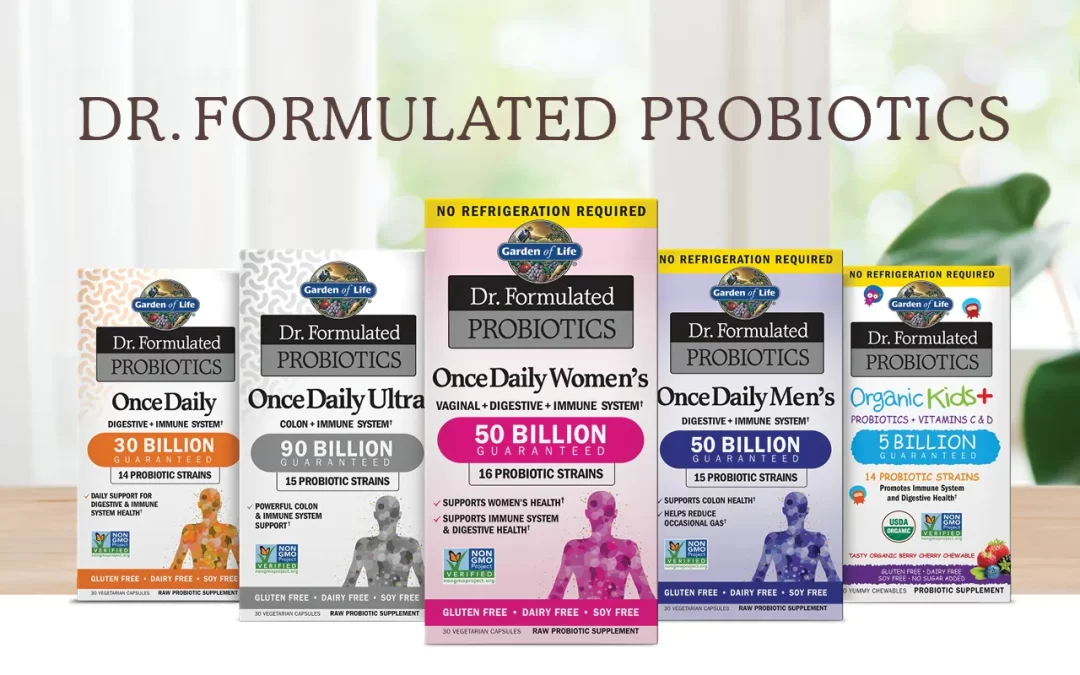Probiotic is a word we may have heard but not know exactly what it is. Probiotics consist of good live bacteria. The National Institutes of Health defines Probiotics as “live microorganisms that, when administered in adequate amounts, confer a health benefit on the host.” In other words, probiotics are live beneficial bacteria that live in your body and help it fight off bad bacteria.
Probiotics are pieces of a bigger picture regarding bacteria and your body called the microbiome. Your microbiome is a diverse community of organisms that work in harmony to keep your body healthy. A healthy microbiome has many positive effects on your body.
Certain bacteria in the microbiome digest fiber which produce short-chain fatty acids. Fiber helps prevent diabetes, weight gain, heart disease, and reduce cancer risk. The gut microbiome also contributes to a healthy immune system. The gut microbiome communicates with immune cells and can help control how your body fights infections. Research has even found that the gut microbiome can affect the central nervous system, which includes your brain. The microbiome is full of trillions of organisms called microbes.
The types of microbes include: bacteria, fungi, viruses, and protozoa. Everyone’s microbiome is unique. No two people have the same makeup of it, including twins. When a microbe is known as a probiotic, it will have a few characteristics. The microbe must be isolated from a human, it must survive in the intestine after being eaten, it needs a proven benefit to you, and it is safely consumed.
The most common place probiotics are known to live in is your gut, particularly in your small intestines. However, probiotics are also found in your mouth, urinary tract, skin, and lungs.
Your body uses probiotics keep a healthy balance. When bad bacteria enters your body and increases in number, it makes you feel sick. Your body needs good bacteria (probiotics) to fight the bad bacteria. This makes your body healthy and helps it stay in balance.
Good bacteria is necessary to fight off bad bacteria and control inflammation. Good bacteria also help your body digest food, create vitamins, support cells that line your gut to prevent bad bacteria that you may have eaten from entering the blood, and to help breakdown and absorb medications. Your body does these actions all the time, but probiotics can help do it better.
Currently, there is research on what conditions probiotics may help the most. However, results may vary between people. What may work for one person, may not work for the next. Some conditions are helped by increasing the number of probiotics taken. Many of the conditions helped by probiotics are common conditions people suffer from. Some conditions helped by probiotics are urinary tract infections, irritable bowel syndrome, upper respiratory infections, and gum disease. Your body can lose probiotics when you take antibiotics, but rest assured, your body will replace them.
Probiotics are relatively easy to find and are in everyday foods. Yogurt is a popular way to get extra probiotics in your body. You do need to keep in mind that not all yogurt has live probiotics. It is necessary then to find yogurt with active or live cultures, so always read the label of a product.
Kefir is another product with probiotics. The word kefir is thought to come from the Turkish word “keyif,” which means feeling good after eating. Kefir is a fermented milk drink with added cultures of lactic acid bacteria and yeast. Kefir is also well-tolerated by individuals who are lactose intolerant.
Pickles are another common food where probiotics are found. Pickles are cucumbers that have been preserved in a mix of water and salt. The cucumbers are left to ferment. They use their own natural lactic acid bacteria. The entire process makes the cucumbers into sour pickles.
If none of the many foods that contain probiotics suit your taste buds, then you can always take a probiotic supplement. Probiotic supplements also can be combined with prebiotics, the “food source” that feeds good bacteria and keeps it healthy. Prebiotics include pectin, inulin, and resistant starches.
Probiotic supplements come in pill form, powders, and liquids. Some strands of probiotics are fragile and need to be stored away from heat, oxygen, light, and humidity. Storing them carefully will ensure your probiotic supplement will give you its maximum benefits. Read any labels on the supplement and make sure to use it by its expiration date. Either increasing probiotics in your diet or taking a probiotic supplement, will improve many of your body’s functions.
Your body is a well-tuned symphony made of many different moving players and parts. Probiotics may help your body keep playing in a healthy and balanced way. A strong microbiome will lead to less illness and more active days. Take the small step of adding more probiotics to your diet and you may see a big difference in your immune health.
At Green Earth, we carry a wide variety of probiotic supplements from popular brands such as Garden of Life, Solaray, Vital Planet, Enymedica, Natural Factors, and more!!
One of Green Earth’s most popular probiotics lines is the Garden of Life Dr. Formulated line. It was created by Dr. Perlmutter with high potency counts of diverse probiotics strains. The Dr. Formulated line is Non-GMO verified and clinically studied to support your specific needs. The line comes in shelf-stable options with a high potency promise.
